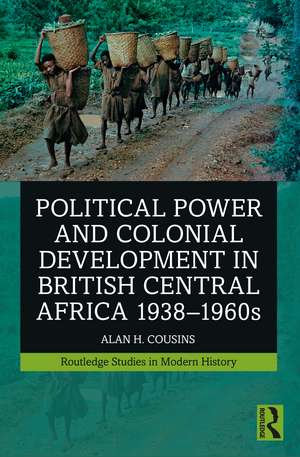Political Power and Colonial Development in British Central Africa 1938-1960s: Routledge Studies in Modern History
Autor Alan Cousinsen Limba Engleză Paperback – 30 dec 2022
Din seria Routledge Studies in Modern History
-
 Preț: 311.26 lei
Preț: 311.26 lei -
 Preț: 311.03 lei
Preț: 311.03 lei -
 Preț: 311.41 lei
Preț: 311.41 lei -
 Preț: 311.41 lei
Preț: 311.41 lei -
 Preț: 312.12 lei
Preț: 312.12 lei -
 Preț: 311.48 lei
Preț: 311.48 lei -
 Preț: 293.09 lei
Preț: 293.09 lei -
 Preț: 310.95 lei
Preț: 310.95 lei - 9%
 Preț: 935.04 lei
Preț: 935.04 lei -
 Preț: 315.15 lei
Preț: 315.15 lei - 9%
 Preț: 937.50 lei
Preț: 937.50 lei -
 Preț: 310.22 lei
Preț: 310.22 lei -
 Preț: 292.89 lei
Preț: 292.89 lei -
 Preț: 311.18 lei
Preț: 311.18 lei -
 Preț: 312.61 lei
Preț: 312.61 lei -
 Preț: 152.85 lei
Preț: 152.85 lei -
 Preț: 326.67 lei
Preț: 326.67 lei -
 Preț: 303.94 lei
Preț: 303.94 lei -
 Preț: 311.70 lei
Preț: 311.70 lei -
 Preț: 295.33 lei
Preț: 295.33 lei -
 Preț: 413.13 lei
Preț: 413.13 lei -
 Preț: 437.13 lei
Preț: 437.13 lei - 26%
 Preț: 764.20 lei
Preț: 764.20 lei -
 Preț: 416.22 lei
Preț: 416.22 lei - 26%
 Preț: 764.62 lei
Preț: 764.62 lei -
 Preț: 495.09 lei
Preț: 495.09 lei - 26%
 Preț: 762.97 lei
Preț: 762.97 lei - 25%
 Preț: 823.41 lei
Preț: 823.41 lei - 18%
 Preț: 729.55 lei
Preț: 729.55 lei -
 Preț: 420.77 lei
Preț: 420.77 lei -
 Preț: 490.40 lei
Preț: 490.40 lei -
 Preț: 416.22 lei
Preț: 416.22 lei - 25%
 Preț: 767.38 lei
Preț: 767.38 lei - 18%
 Preț: 1004.55 lei
Preț: 1004.55 lei - 26%
 Preț: 764.20 lei
Preț: 764.20 lei - 26%
 Preț: 876.36 lei
Preț: 876.36 lei - 18%
 Preț: 1113.91 lei
Preț: 1113.91 lei - 18%
 Preț: 1001.07 lei
Preț: 1001.07 lei - 18%
 Preț: 1000.27 lei
Preț: 1000.27 lei - 26%
 Preț: 819.90 lei
Preț: 819.90 lei - 18%
 Preț: 1000.27 lei
Preț: 1000.27 lei - 18%
 Preț: 1004.55 lei
Preț: 1004.55 lei
Preț: 295.40 lei
Nou
Puncte Express: 443
Preț estimativ în valută:
56.53€ • 58.68$ • 47.14£
56.53€ • 58.68$ • 47.14£
Carte disponibilă
Livrare economică 04-18 martie
Livrare express 15-21 februarie pentru 29.19 lei
Preluare comenzi: 021 569.72.76
Specificații
ISBN-13: 9781032320250
ISBN-10: 1032320257
Pagini: 268
Ilustrații: 9 Tables, black and white; 4 Halftones, black and white; 4 Illustrations, black and white
Dimensiuni: 152 x 229 x 20 mm
Greutate: 0.36 kg
Ediția:1
Editura: Taylor & Francis
Colecția Routledge
Seria Routledge Studies in Modern History
Locul publicării:Oxford, United Kingdom
ISBN-10: 1032320257
Pagini: 268
Ilustrații: 9 Tables, black and white; 4 Halftones, black and white; 4 Illustrations, black and white
Dimensiuni: 152 x 229 x 20 mm
Greutate: 0.36 kg
Ediția:1
Editura: Taylor & Francis
Colecția Routledge
Seria Routledge Studies in Modern History
Locul publicării:Oxford, United Kingdom
Cuprins
1. ‘Inheritance from the Past and Legacy to the Future’: Themes and Concepts
2. Background to Development Policies in Nyasaland and Northern Rhodesia, and the Road to Federation
3. White Ethnicity, Power and Development in Northern Rhodesia, 1938-1960s
4. ‘A White Man's Country’? Europeans, Politics and Race in Northern Rhodesia, 1938-1960s
5. Food, Land and Labour: Agricultural Development and Policies in Nyasaland, 1938-1961
6. Realities of ‘What Lies Ahead’: African Politics and Development Policies in Nyasaland to the 1960s
7. Conclusion - From Colonial Rule in 1938 to Independence in the 1960s
2. Background to Development Policies in Nyasaland and Northern Rhodesia, and the Road to Federation
3. White Ethnicity, Power and Development in Northern Rhodesia, 1938-1960s
4. ‘A White Man's Country’? Europeans, Politics and Race in Northern Rhodesia, 1938-1960s
5. Food, Land and Labour: Agricultural Development and Policies in Nyasaland, 1938-1961
6. Realities of ‘What Lies Ahead’: African Politics and Development Policies in Nyasaland to the 1960s
7. Conclusion - From Colonial Rule in 1938 to Independence in the 1960s
Notă biografică
Alan H. Cousins was Principal Lecturer at the College of St. Mark and St. John, Plymouth, and is now an independent researcher.
Descriere
This book focuses on the late colonial history of Zambia and Malawi, which between 1953 and 1963 were part of the Federation of Rhodesia and Nyasaland and on issues of social and economic development. The book examines the actual nature of rural economic change and discusses alternative visions of the future which were put forward.
